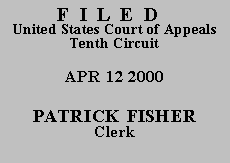
| BILLY RAY THOMAS,
vs.
BOBBY BOONE, Warden |
|
Ordinarily, "the failure to make timely objection to the magistrate's findings or recommendations waives appellate review of both factual and legal questions." Moore v. United States, 950 F.2d 656, 659 (10th Cir. 1991). However, the waiver rule need not be applied when justice dictates otherwise. In the instant case, Mr. Thomas claims that he never received a copy of the magistrate's findings and recommendation, and therefore should not be held responsible for the failure to file objections. In the interests of justice, we assume that Mr. Thomas did not receive the magistrate's report, and accordingly address the habeas petition on the merits. See Tesoro v. Colorado, No. 97-1048, 1997 WL 787173, at **1 (10th Cir. Dec. 23, 1997) (unpublished opinion).
Mr. Thomas claims that there was insufficient evidence to convict him under Okla. Stat. tit. 21, § 51(B) because the state "failed to provide sufficient evidence of the finality of the prior convictions." Aplt. Br. at 6; see also Linebarger v. Oklahoma, 527 P.2d 178, 183 (Okla. Crim. App. 1974). The OCCA addressed this issue on direct appeal and specifically found that "the State presented sufficient circumstantial proof of the finality of Thomas' prior felony convictions through the introduction of certified copies of his prior judgments and sentences." OCCA Case No. F-97-1691, at 2 (Oct. 5, 1998) (OCCA Order), at R. doc. 9, Ex. A.
Under 28 U.S.C. § 2254(d), federal habeas will not be granted "with respect to any claim that was adjudicated on the merits in State court proceedings" unless the state court decision was (1) contrary to clearly established federal law or (2) unreasonable in light of the evidence. The decision of the OCCA was a resolution on the merits and Mr. Thomas has not shown how it is contrary to federal law, even assuming that the issue raised implicates sufficiency of the evidence under Jackson v. Virginia, 443 U.S. 307, 319 (1979). Nor is the decision unreasonable in light of the six certified copies of judgment and sentence introduced by the state, which ranged in time from 1984 to 1994. "When an appeal has not been perfected within six months of the judgment and sentence as provided by law, that judgment and sentence may be used to enhance punishment in a subsequent trial under 21 O.S.1981, § 51." Anhaitty v. State, 715 P.2d 82, 84 (Okla. Crim. App. 1986).
Mr. Thomas also claims that the imposition of a forty-five year sentence violates the Eighth Amendment prohibition against cruel and unusual punishments. We agree with the OCCA "that a sentence of forty-five years is not shocking under the circumstances of this case, especially given Thomas' numerous prior convictions for similar theft crimes." OCCA Order at 2.
AFFIRMED.
Entered for the Court
Paul J. Kelly, Jr.
Circuit Judge
*. This order and judgment is not binding precedent, except under the doctrines of law of the case, res judicata, and collateral estoppel. This court generally disfavors the citation of orders and judgments; nevertheless, an order and judgment may be cited under the terms and conditions of 10th Cir. R. 36.3.
**. After examining the briefs and the appellate record, this three-judge panel has determined unanimously that oral argument would not be of material assistance in the determination of this appeal. See Fed. R. App. P. 34(a); 10th Cir. R. 34.1 (G). The cause is therefore ordered submitted without oral argument.